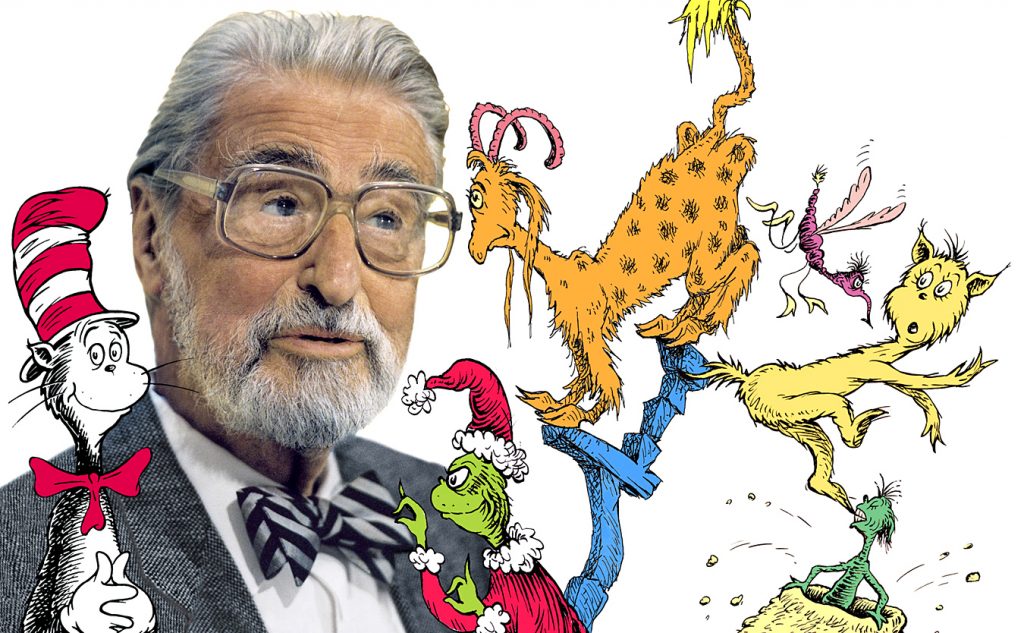Theodor Geisel, beloved children’s author, had a life before he put the hat on the cat. Born March 2, 1904, in Springfield, Massachusetts, Geisel was the only son of German-born immigrants. He spent a normal childhood with his sister and parents, before going to college to become a teacher. Geisel dropped out of college shortly before completing his doctorate in literature. He would eventually turn his almost doctorate and his mother’s maiden name into his now famous pen name, Dr. Seuss.1

In 1927, Geisel decided to turn his passion for drawing and writing into a career in advertising. One of his early successes in advertising was his drawing for Flit insecticide, whose mascot looked very similar to the cat that would eventually wear a striped hat.2 He later created an entire campaign for Essomarine Oil, a division of Standard Oil, called Seuss Navy, in which he designed certificates of membership, pamphlets, and even ashtrays and cocktail glasses that were passed out at trade shows. The Seuss Navy ads ran from 1936 to 1941, and contained many of the sea creatures that would later appear in his books.3 Geisel used many of his made up creatures in various ad campaigns and was the first person to use humor to sell products, altering the advertising industry.4

In 1941, Geisel left advertising to work as a political cartoonist for liberal New York newspaper PM. He drew over 4oo cartoons targeting such topics as isolationism, antisemitism, and racism. He routinely mocked Hitler and Mussolini, but he had a particular flair for attacking American nationalism as well. Believing that the American Nationalist Movement was just another form of fascism, Geisel made Charles Lindbergh a frequent subject of his cartoons.5 After the Japanese attack on Pearl Harbor, Geisel began to use his cartoons to support the war against Japan. He drew cartoons that “depicted Hideki Tojo, the Prime Minister and Supreme Military Leader of Japan, as an ugly stereotype, with squinting eyes and a sneering grin.”6 Geisel was in support of Japanese internment camps and drew several cartoons about them.

It can be hard to imagine that Dr. Seuss could be a racist in his depiction of Asians, but he later admitted that this was exactly the case. At the time, PM did not receive one letter of complaint about Geisel’s stereotypical depiction of Asians, although they received many letters when Geisel mocked the German dachshund, which was popular among American dog owners. Dr. Seuss later said that his 1954 book, “Horton Hears a Who,” written after a trip to Japan and dedicated to a Japanese friend, is meant to be an apology to the Japanese people for his depictions of them during World War II. In the 1980’s, Geisel looked through all his children’s books and removed anything he felt was racist, changing them for any future publication.7
Geisel’s political cartoons ended when he joined the Army in 1943. The now Captain Geisel was assigned to a unit that made training films for the Army, working with the likes of Stan Lee (creator of super heroes) and Chuck Jones (creator of the Road Runner and Wile E. Coyote).8 Geisel and Jones would become life long friends and would work together on various projects, including the animated “How the Grinch Stole Christmas,” which is still shown every year on television.

Geisel’s first children’s book was “And to Think I Saw It on Mulberry Street,” and was published in 1937. However, his writing career almost never happened. The book had been turned down by 27 publishers and Geisel was ready to give up the idea of becoming a children’s author when he ran into an old college friend while walking down the street. His friend had recently become an editor at Vanguard Press and asked Geisel to send him the book so he could show his boss. Geisel would later say in interviews that it was pure luck that he walked down that side of the street that day.9
Dr. Seuss later claimed that he did not like to write books that had a moral or ethical lesson, because children could see a lesson coming and would not want to read the book.10 However, all of Geisel’s books, except his Beginner Books, contained lessons of some sort. Dr. Seuss wrote books with lessons on environmentalism, racial equality, the pointlessness of the arms race, materialism, and respect, just to name a few. He was one of the first children’s authors to write books for children with the respect and care typically reserved for adult literature.11
Dr. Seuss died on September 24, 1991 at his home. He was asked shortly before he passed away to leave a message for children. He wrote “The best slogan I can think of to leave the kids of the U.S.A. would be ‘We can…and we’ve got to…do better than this.’ He then crossed out ‘the kids of.'”12 Dr. Seuss left a legacy of children’s literature that will not soon be forgotten, but he did more than that; Dr. Seuss taught children to think.
- Janet Schulman and Cathy Goldsmith, Your Favorite Seuss (New York: Random House, 2004), 6. ↵
- Louis Menand, “Cat People,” The New Yorker (December 2002). ↵
- Janet Schulman and Cathy Goldsmith, Your Favorite Seuss (New York: Random House, 2004), 55. ↵
- Janet Schulman and Cathy Goldsmith, Your Favorite Seuss (New York: Random House, 2004), 117. ↵
- Sophie Gilbert, “The Complicated Relevance of Dr. Seuss’s Political Cartoons,” The Atlantic (January 2017). ↵
- Sophie Gilbert, “The Complicated Relevance of Dr. Seuss’s Political Cartoons,” The Atlantic (January 2017). ↵
- Sophie Gilbert, “The Complicated Relevance of Dr. Seuss’s Political Cartoons,” The Atlantic (January 2017). ↵
- Janet Schulman and Cathy Goldsmith, Your Favorite Seuss (New York: Random House, 2004), 9. ↵
- Louis Menand, “Cat People,” The New Yorker (December 2002). ↵
- Janet Schulman and Cathy Goldsmith, Your Favorite Seuss (New York: Random House, 2004), 190. ↵
- Janet Schulman and Cathy Goldsmith, Your Favorite Seuss (New York: Random House, 2004), 84. ↵
- Janet Schulman and Cathy Goldsmith, Your Favorite Seuss (New York: Random House, 2004), 190. ↵



125 comments
Derek Esquivel
Growing up I have always loved watching and reading his books. Even till this day, I am still watching his movies with my little cousins and still even enjoying them to this day at my age. It just still shows that even in today’s time that Dr. Suess is still a major icon to all kids in today’s world even after so many years after his books have been published. Even after his death he is still helping a lot of kids learn important lessons in today’s world and allow them to become better people when they grow up.
Marlene Lozano
Growing up my mom always read Dr. Seuss books to me; I always found his books fun and interesting. After reading this article I was surprised to find out that Dr. Seuss was racist, but was impressed that he admitted to it and apologized for what he had done. Also, I find it interesting that the idea of the cat in the hat came from past drawings.
Didier Cadena
I grew up reading Dr. Seuss’ books, so it was really engaging to read about his life before he became Dr. Seuss. I was unaware that he used to draw political cartoons that would be now considered inappropriate to do. I was also unaware that he would later go on to apologize for some of his work and then would remove anything that would seem inappropriate. It was interesting to read about one of my favorite authors from when I was growing up. The article does a great job of telling his story and including some important facts about his life.
Maricela Guerra
Dr. Seuss is a an exquisite writer, his drawings and his stories are very entertaining. His books are still being sold to this day and have made a impact to american literature. When I think of Dr. Seuss the first thing that comes to mind is a memory that I have as a child. A memory of me sitting in the middle of the classroom waiting for my teacher to read us another story by Dr. Seuss. I didn’t realize till now that his stories all had a meaning behind it, and that they weren’t just any children’s book.
Alexandra Cantu
As a little girl I grew up reading Dr. Seuss books- they are fun and interesting. I was excited to read this article and I ended up learning new things about Dr. Seuss. First, his actual name. That was quite interesting. I never knew he did advertising for a bit and how we was a bit of a racist. now that was surprising. However, it was nice to know that he apologized for his degrading writing and drawings. And towards the end gave fun and innovative stories to children that will forever be read.
Isaac Rodriguez
As someone who grew up reading Dr. Seuss books, this article was an interesting read. I knew of many Dr. Seuss books, but was not aware of what kind of person he was. The section of the article that stuck out to me the most when the author described Dr. Seuss from the 1950’s to the 1980’s. I did not know Horton Hears a Who was written as an apology to the Japanese people, and find it kind-hearted of him to do. And by removing anything that could be interpreted as racist, he acknowledged his wrongdoings.
Natalie Childs
I, as I’m sure a good chunk of us, grew up on Dr. Seuss books. My grandmother, in particular, had a pension for them, and had a large collection of most, if not every one, of his books. With all of this said, I never knew anything about his early life and beginnings and it was incredibly interesting to read about his beginnings. There truly is much more to him than I knew.
Cameron Ramirez
As a young kid, I would always read the Dr. Seuss books my parents gave me as a kid. I loved The Cat in the Hat, Horton Hears a Who, and Green Eggs and Ham. I never really knew much about Dr. Suess but I am glad that I know a bit more of Dr. Suess. His message and his art style will always leave a lasting impression on me and I hope that all kids have the chance to read at least one Dr. Suess book because I enjoyed them so deeply as a kid. Overall, good work on your article I enjoyed it. I also liked the pictures you added from before Dr. Suess made kid books.
Erik Shannon
This was a very good article. I never knew the “real” Dr. Seuss. I did not know that he was involved in politics and advertising before he became and iconic writer in children’s literature. I didn’t know that all his books had a moral and life lessons behind each one. Dr. Seuss was really an iconic figure in the writing industry and had an amazing impact on literature.
Megan Barnett
I never knew that Dr. Seuss was a pen name and I guess I never really looked into the history of his life so I had no clue that he was also a political cartoonist or worked in advertising. However, it is hard to believe that someone who you thought of as just a children’s book writer to be racist or tackling world issues through writing.